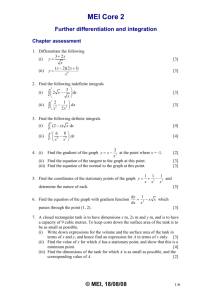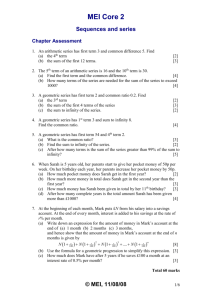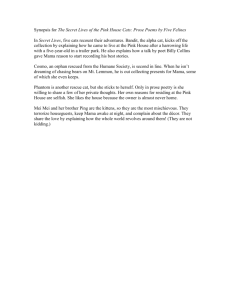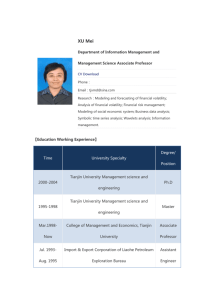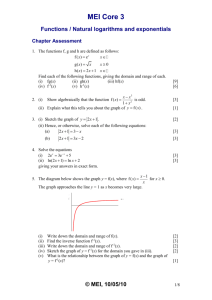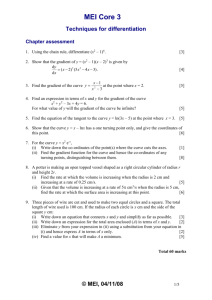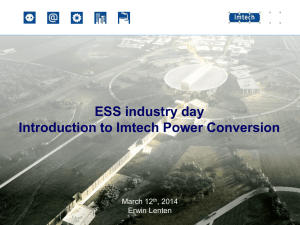2005 Annual Report - Middle East Institute
advertisement
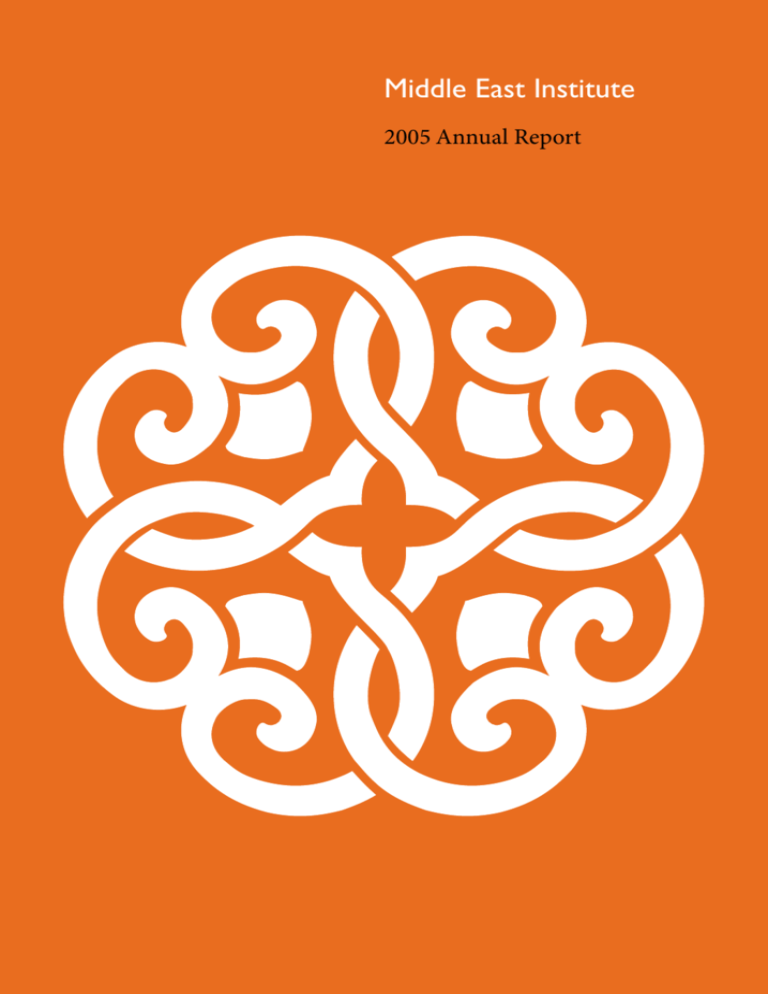
Middle East Institute 2005 Annual Report The Middle East Institute (MEI) was founded in 1946 by Christian Herter, who would soon be named US Secretary of State, and George Camp Keiser, a Middle East scholar. The Institute was initially an adjunct of Johns Hopkins University-School for Advanced International Studies but was then spun off as an independent non-profit organization. There were no organizations in the Washington area at that time that focused on the contemporary Middle East. MEI was designed to fill the void. The Institute’s charter promised: “…to increase knowledge of the Middle East among citizens of the United States and to promote a better understanding between the peoples of these two areas.” This remains the Institute’s objective. Traditionally, MEI has not taken positions on issues and does not identify with a particular political party or with a specific side on the many disputes that have wracked the region. The Institute continues that policy today. Instead, MEI offers a forum for debate, opinion, and analysis through a variety of educational and informational programs, including briefings and seminars, media outreach, a scholars program, a quarterly peer-reviewed scholarly journal, a language program, a library, and various conferences. The Institute is supported by individual and corporate members, by individual donors, and by foundations. MEI is a membership organization, but many of its programs are open to the public. Both policy papers and informational resources are available on its website. 1 Letter from the President One year shy of our 60th anniversary, it is a time to reflect on the past and think of the future. Unfortunately, the Middle East is still a scene of conflict and that means we need to work harder in pursuing our mission to promote knowledge of the Middle East in America and strengthen understanding of the United States by the people and governments of the region. We have done a lot during the past year to further that goal, including more than 50 lectures on topics ranging from “Democratization in the Middle East” to “Educational Reform in Egypt and the Arab World.” Attendance to our events continues to increase. More than 1,500 MEI members, government officials, congressional staffers, businessmen, and members of the media visited MEI to participate in our noontime briefings. Many more were able to read summaries or transcripts of the events on our website. The popularity of our programming has also attracted partners for larger events, including the Foundation for Middle East Peace and the Asia Foundation. A special conference focusing on the Arab-Israeli peace process featured the top four negotiators under the Clinton Administration in a rare and insightful debate that was also webcast live to audiences in Texas and Ohio. The archived webcast is available through our website for media and scholarly reference. MEI’s 59th Annual Conference was a double-barreled success, garnering considerable media coverage for keynote speaker Prince Turki al-Faisal in his debut as the newly-appointed Saudi Ambassador to the United States. Former presidential advisor Dr. Zbigniew Brzezinski addressed the Annual Conference Welcome Banquet. He provided a thought-provoking analysis of US policies toward the Middle East and advice on how to open channels of communication rather than close them. Several panel discussions proved particularly prescient, especially the debate on Iraq’s political future and the discussion about competition for new energy sources. The conference attracted more than 400 people, including MEI members, staffers from Congress, embassy and US government officials, business executives, university students and professors, and the media. Speaking of the media, MEI scholars and staff continue to provide reliable and balanced information and analysis to US and international media outlets. As events in the Middle East warrant more thoughtful commentary, MEI continues to receive a large number of media queries and citations — well over 3,200 in 2005. We are reaching out to the American heartland through media interviews, op-eds, meetings with editorial boards, and speaking engagements for our scholars and staff at universities, World Affairs Councils, and other gatherings. We also participated in media conferences in the Middle East, which allowed us to expand our reach into the 2 region with very positive results. In a major step forward, MEI can now boast a fully accredited language and area studies program. Under Dr. Shukri Abed’s leadership, the Department of Languages and Regional Studies passed the rigorous requirements for accreditation by the Accrediting Council for Continuing Education and Training. The added value for our language program comes at a time when there is a great need for Arabic and Persian speakers. Enrollment in all our language classes has steadily increased to 1,012 students, a 13% increase over 2004. In another MEI effort to improve communication between the peoples of the US and the Middle East, we officially launched the Sultan Qaboos Cultural Center (SQCC), thanks to the generous support and cooperation of the Sultanate of Oman. The SQCC will explore and promote the culture and heritage of Oman, the Arabian Peninsula, Iraq, and Iran. MEI has vital tasks to help educate, dispel stereotypes, and provide a forum for dialogue. We have many talented people working on our behalf to fulfill our mandate. We appreciate the continued loyalty and support of our members and donors who share our belief that we can and do make a difference. Edward S. Walker, Jr. President 3 MEI Programs The Middle East Institute’s Programs offer an in-depth, timely look at current events and the underlying issues spanning the region from Afghanistan to Morocco to Yemen. The substantive coverage offered by MEI’s 2005 conferences, panels, policy programs, book launches, roundtable discussions and corporate briefings demonstrated its importance as a forum for discussion and dissemination of information in Washington, beyond the Beltway, and to the Middle East. Major Symposiums Lessons of Arab-Israeli Peacemaking: Four Negotiators Look Back and Ahead As the Bush Administration re-engaged in Arab-Israeli peacemaking, the Middle East Institute hosted four of the top negotiators responsible for US policy toward the peace process under the Clinton Administration on April 25, 2005. Reflecting on their experiences and on what went right and what went wrong, these seasoned negotiators brought invaluable lessons to the revived efforts to broker peace in the Middle East. Martin Indyk, Saban Center at the Brookings Institution, former US Ambassador to Israel and Assistant Secretary of State for Near East Affairs Robert Malley, International Crisis Group, former NSC Advisor for Arab-Israeli Affairs to President Clinton Aaron David Miller, Seeds of Peace, former Deputy Special Middle East Coordinator Dennis Ross, Washington Institute for Near East Policy, former US Ambassador and Special Middle East Coordinator Moderator: Edward S. Walker, President of the 4 Middle East Institute Fractured Realities: A Middle East in Crisis 59th Annual Conference The 59th Annual Conference was held on November 7-9, 2005 at the National Press Club. As conflicts and insurgencies continued to hinder efforts to foster positive changes in the Middle East, MEI panelists offered detailed analysis on pressing issues such as energy, intelligence gathering in the region, reconstruction efforts in Iraq and Afghanistan, and prospects for Palestinian-Israeli peace after the Israeli withdrawal from Gaza. Welcoming Banquet Zbigniew Brzezinski, Former National Security Advisor Keynote Address HRH Prince Turki Al-Faisal, Ambassador of the Kingdom of Saudi Arabia to the US Collecting and Understanding US Intelligence on the Middle East Frank Anderson, Retired CIA Operative Rand Beers, former Counterterrorism Advisor John Moore, retired Defense Intelligence Agency Analyst Moderator: Wayne White, Retired State Deptartment Intelligence Analyst and MEI Adjunct Scholar The Escalating Conflict Between Syria, Iran, and the US Seymour Hersh of The New Yorker Hisham Melhem, host of “Across the Ocean,” Al-Arabiya TV Theodore Kattouf, President of AMIDEAST Moderator: Michael Collins Dunn, Editor of The Middle East Journal. Understanding the Global Insurgency Alberto Fernandez, Director of Public Diplomacy in the US State Department Michael Scheuer, author of Imperial Hubris Robert Pape, author of Dying to Win Zaki Chehab, Political Editor of Al-Hayat and LBC TV Moderator: Syed Farooq Hasnat, MEI Adjunct Scholar Reconstructing Afghanistan and Iraq Larry Goodson, Director of Middle East Studies at the Army War College Ali Jalali, Former Afghan Interior Minister Samir Sumaidaie, Iraqi Representative to the UN Phebe Marr, Senior Fellow at the US Institute of Peace Moderator: David Mack, Vice President of the Middle East Institute Where Will the Energy Come From? David Goldwyn, CEO of Goldwyn International Strategies Raad Alkadiri, Director of the Country Strategies Group, Petroleum Finance Corporation Moderator: Herman Franssen, President of International Energy Associates and MEI Adjunct Scholar Building a Successful Palestinian State Steven Simon and Ross Anthony, RAND Corporation Laith Arafeh, Palestine Liberation Organization Schlomo Brom, US Institute of Peace Moderator: Robert Danin, Deputy Assistant Secretary of State for Near Eastern Affairs Arguments for Both the One and Two-State Solutions Amjad Atallah, President of Strategic Assessments Initiative Virginia Tilley, author of The One State Solution Aaron David Miller, President of Seeds of Peace Ehud Eiran, Harvard Research Fellow Moderator: James Bennet, The New York Times Magazine Negotiations vs. Unilateralism Daniel Kurtzer, Former US Ambassador to Israel Gideon Grinstein, Founder and President of Re’ut Institute Robert Malley, Director of the Middle East Program at the International Crisis Group Moderator: Steve Solarz, APCO Worldwide and Former US Congressman Corporate Briefings Crisis in Sudan John Limbert, Former Charge d’Affaires of the American Embassy in Khartoum The Current Status of US-Syrian Relations Margaret Scobey, US Ambassador to Syria Egypt’s Role in Resolving the Israeli-Palestinian Conflict Omar Soliman, Chief of the Egyptian Intelligence Service Iran, the US and Europe Tim Guldimann, Swiss Federal Department of Foreign Affairs Iraq and Issues for US Policy Richard Jones, Secretary of State’s Senior Advisor and Coordinator for Iraq Policy Libya Trip Report David Mack, Vice President of the Middle East Institute Tunisian Views on Regional Issues and US-Tunisian Relations Habib Ben Yahia, Diplomatic Advisor to the President of Tunisia 5 Update on Afghanistan Following the Parliamentary Elections Ronald Neumann, Ambassador to the Islamic State of Afghanistan Update on Iraq Ronald Neumann, then senior staff member at the US Embassy of Baghdad with special responsibility for political-military affairs Update on Qatar Chase Untermeyer, US Ambassador to Qatar; co-sponsored by the US Qatar Business Council Policy Programs CAUCASUS Identity and Nation-Building in the Caucasus and Iran: The Case of Azerbaijan Cameron Brown, Deputy Director of the Global Research in International Affairs Center EGYPT AND NORTH AFRICA Advancing Women’s Rights in Egypt Mona Zulficar, Egyptian Lawyer and Human Rights’ Activist AFGHANISTAN AND PAKISTAN Democratization in the Middle East Saad Eddin Ibrahim, Egyptian Human Rights Activist Afghanistan’s Next Steps: Commentary on the Recent and Upcoming Elections Massouda Jalal, Afghanistan’s Minister of Women’s Affairs Educational Reform in Egypt and the Arab World Ahmad Gamal El-Din Moussa, Egypt’s Minister of Education Afghanistan: To the Parliamentary Elections and Beyond William Maley, Director of the Asia-Pacific College of Diplomacy at the Australian National University Morocco’s Islamist Awakening Marvine Howe, Author of Morocco: The Islamist Awakening and Other Challenges Approaching Challenges for a Democratic Afghanistan Keith Schulz, Governance Advisor, USAID Marvin Weinbaum, MEI Adjunct Scholar Abdullah’s Kingdom: Saudi Arabia after King Fahd Thomas Lippman, MEI Adjunct Scholar and Author of Inside the Mirage: America’s Fragile Partnership with Saudi Arabia Pakistan’s Domestic Scene Syeda Abida Hussain, former Pakistani Ambassador to the US Syed Fakhar Imam, former Speaker of Pakistan’s National Assembly Pakistan’s Foreign Policy toward Iran and Afghanistan Syed Rifaat Hussain, Professor at Quaid-I6 Azam University (Islamabad, Pakistan) GULF STATES Democracy, Women’s Rights, and Reform: Recent Developments in Kuwait Brian Katulis, Freedom House Kelley Jones, Senior Resident Representative in Kuwait, National Democratic Institute Neil Hicks, Director of International Programs for Human Rights First Dialogue with Yemeni Islamists Hamoud Alhitar, Yemeni High Court Judge and Chairman of Yemen’s Dialogue Committee Insights into Iranian Foreign Policy M. Javad Zarif, Iran’s Permanent Representative to the UN Empowering Saudi Women HRH Princess Loulwa Al-Faisal, Princess of Saudi Arabia Iran, Iraq and the Legacies of War Lawrence Potter, Professor of International Affairs at Columbia University Shaul Bakhash, Professor of Middle East History at George Mason University Joost Hiltermann, Middle East Project Director at the International Crisis Group Oman: Desert, Oasis, and Sea MEI Associated Exhibit at 2005 Smithsonian Folklife Festival Opportunities for Economic and Political Reform in the Kingdom of Saudi Arabia Ghassan Al Sulaiman, Co-Chair of the National US-Arab Chamber of Commerce and Chairman of the Jeddah Chamber of Commerce Usamah Al Kurdi, Member of the Saudi Consultative Council Update on Saudi Arabia Khaled Al Maeena, Editor-in-Chief of Arab News IRAN AND IRAQ Broadcasting to Iran and Iraq David Newton, MEI Adjunct Scholar and former Director of Radio Free Iraq Stephen Fairbanks, former Director of Radio Free Europe/Radio Liberty Persian Service Constitutional and Political Challenges Facing a New Iraqi Government Feisal Istrabadi, Iraq’s Deputy Representative to the UN From Revolution to Stasis: The US and Iran Henry Precht, former Chief of the Iran Desk at the State Department Charles Naas, former Deputy Ambassador in Tehran Iraqi Elections and Politics in Their Aftermath Juan Cole, Professor at the University of Michigan Insurgency and Iraqi Politics Aiham Al Sammarae, CEO of KCI Engineering and former Iraqi Minister of Electricity Kurdish Nationalism and State Formation Robert Olson, Professor at the University of Kentucky and Author of The Goat and the Butcher: Nationalism and State Formation in Kurdistan-Iraq The Future of the Iraqi Oil Ministry Issam Al Chalabi, former Iraqi Oil Minister ISRAEL AND THE PALESTINIAN TERRITORIES A Briefing on Jerusalem Hind Khoury, Minister of State for Jerusalem Affairs After Iraq and Arafat: Israel between Syria and Palestine Moshe Ma’oz, US Institute of Peace Fellow An Israeli Perspective on Gaza Disengagement Aharon Klieman, Professor at Tel-Aviv University and Visiting Professor at UCLA 7 Beyond Gaza: Roadmap to Where? Yasser Abd Rabbo, Co-Author of the Geneva Initiative Yossi Beilin, Co-Author of the Geneva Initiative and Leader of the Yahad Party Conceptualizing a Successful Palestinian State Ross Anthony, Senior Economist at RAND Corporation Steven Simon, Senior Analyst at RAND Corporation Ending the Israeli-Palestinian Conflict: A Briefing by Retired Shin Bet Director Ami Ayalon Ami Ayalon, retired Chief of the Israeli Navy and former Director of the General Security Services (Shin Bet) Is a Two-State Solution Still Possible? Maen Areikat, Director General of the Negotiations Affairs Department of the PLO Zeinah Salahi, Legal Advisor on Border Issues for the Negotiations Affairs Department Khaled Elgindy, Policy Advisor for Settlements for the Negotiations Affairs Department Israel and Palestine after the Gaza Withdrawal Yael Dayan, Deputy Mayor of Tel Aviv Mapping Jerusalem: One Capital or Two? Jan de Jong, Leading Mapmaker of the West Bank, Gaza, and Jerusalem Post-Disengagement Security and Diplomacy Danny Rothschild, President of the Council for Peace and Security The Case for Talking with Hamas and Hizbullah Alastair Crooke, UK Director of Conflicts Forum Mark Perry, US Director of Conflicts Forum 8 The Impact of Elections on Negotiations Saeb Erekat, head of the PLO Negotiations Affairs Department and an elected representative of Jericho The Israeli-Palestinian Peace Process: New Hopes and Old Realities Gershon Baskin, Co-Director of the Israel Palestine Center for Research and Information The Palestinian Economy in the Wake of Disengagement Karen Koning AbuZayd, Commissioner-General of the United Nations Relief and Works Agency The Palestinian Elections and Prospects for the Future Ziad Asali, President of the American Task Force on Palestine Will Israel End the Occupation of Gaza? Geoffrey Aronson, Director of Research and Publications at the Foundation for Middle East Peace LEBANON AND SYRIA Democratic Prospects in Syria Najib Ghadbian, Professor at the University of Arkansas Hizbullah as an Actor in the Lebanese Elections Helena Cobban, Columnist for The Christian Science Monitor and Al-Hayat What’s Happening in Lebanon? Rami Khouri, Editor of the The Daily Star REGIONAL ISSUES Democracy Promotion in the Middle East: A View from the Street Radwan Masmoudi, President of the Center for the Study of Islam and Democracy Educational and Political Reform in the Middle East Shafeeq Ghabra, President of the American University of Kuwait Moderate Islam and the Fruits of Economic Development Stephen Glain, Newsweek Correspondent and Author of Merchants, Mullahs and Militants Public Diplomacy and Dialogue with the Arab and Islamic World Gunter Mulack, German Commissioner for Dialogue with the Islamic World Night Draws Near: Iraq’s People in the Shadow of America’s War Anthony Shadid, Washington Post Correspondent Shared Histories: A Palestinian-Israeli Dialogue Paul Scham, MEI Adjunct Scholar Syria’s Terrorist War on Lebanon and the Peace Process Marius Deeb, Professor at Johns Hopkins School of Advanced International Studies Religion and Diplomacy John Stempel, Professor at the University of Kentucky’s Patterson School of Diplomacy and International Commerce Russia in the Middle East: Is Putin Undertaking a New Strategy? Robert Freedman, Professor at Johns Hopkins University and Baltimore Hebrew University BOOK LAUNCHES Devil’s Game: How the US Helped Unleash Fundamentalist Islam Robert Dreyfuss, Rolling Stone Correspondent Inheriting Syria: Bashar’s Trial by Fire Flynt Leverett Inheriting the Holy Land: An American’s Search for Hope in the Middle East Jennifer Miller Lipstick Jihad Azadeh Moaveni Morocco: The Islamist Awakening and Other Challenges Marvine Howe 9 The Middle East Journal The year opened with Adeed Dawisha’s article on democracy in Iraq under the monarchy, an article that drew considerable critical praise, given its challenge to the conventional wisdom that there is no history of democracy or parliamentary life in Iraq. The spring issue carried a range of articles on the shifting geopolitics of the region since the Iraq War, while the summer issue was devoted to articles dealing with democracy, civil society, and other forms of political development in the region, including an article by Frauke Heard-Bey on the UAE. Autumn led with a major piece by John Entelis on the Maghrib. As always, each issue carried a major Book Review Essay as well as extensive reviews of new books in the field, and the quarterly Chronology. The Journal is concentrating its efforts on expanding its circulation and making the website more useful, with plans for selling individual articles through the website moving forward. The Journal continues to be available on newsstands, primarily at Borders and Barnes & Noble outlets. The year 2005 marked a year of change for The Middle East Journal. In February, Jennifer McElhinny, a recent MA in Arab Studies from Georgetown University and a former Peace Corps volunteer in Jordan, replaced Julia Voelker as the Journal’s Assistant Editor. In the summer, upon the departure of Managing Editor Amged Soliman, McElhinny was promoted to Managing Editor and Lindsay Morgan, holder of a recent Masters in Middle East Politics from the University of Durham (UK) and an experienced journalist, joined the staff as the new Assistant Editor. Editor Michael Dunn, Book Review Editor John Calabrese, Publications Assistant Nancy Wood, Circulation Assistant Lisa Barr, and General Services Officer Thomas Peck remained in their positions. Middle East Journal Articles, 2005 Articles in Volume 59, Number 1, Winter 2005: 10 Adeed Dawisha, Democratic Attitudes and Practices in Iraq, 1921-1958 Carol J. Riphenburg, Ethnicity and Civil Society in Contemporary Afghanistan Murhaf Jouejati, Syrian Motives for its WMD Program and What to Do Hesham Al-Awadi, Mubarak and the Islamists: Why Did the ‘Honeymoon’ End? Robert D. Burrowes, The Famous 40: North Yemen’s First Generation Modernists Robert Parks, Algeria’s 2004 Presidential Elections (Stevens Award Essay) Simon Payaslian, Book Review Article, The US and the Armenian Genocide Articles in Volume 59, Number 2, Spring 2005: Special Issue on Changing Geopolitics Richard L. Russell, Iraq’s Chemical Weapons Legacy: What Others Might Learn Fairborz Mokhtari, No One Will Scratch My Back: Iranian Security Perceptions in Historical Context Leila Farsakh, Independence, Cantons, or Bantustans: Whither the Palestinian State? Mustafa Kibaroglu, Clash of Interest Over Northern Iraq Drives Turkish-Israeli Alliance to a Crossroads Ziya Onis and Suhnaz Yilmaz, The Turkish-EU-US Triangle in Perspective: Transformation or Continuity Amaney Jamal and Sunaina Maira, Book Review Article, Muslim-Americans: Partners or Targets? Articles in Volume 59, Number 3, Summer 2005: Special Issue on Democratization and Civil Society Frauke Heard-Bey, The United Arab Emirates: Statehood and NationBuilding in a Traditional Society Jeremy Jones and Nicholas Ridout, Democratic Development in Oman Bruce Maddy-Weitzman, Women, Islam, and the Moroccan State: The Struggle over the Personal Status Law Sonia Cardenas and Andrew Flibbert, National Human Rights Institutions in the Middle East Esther Hertzog, Women’s Parties in Israel: Their Unrecognized Significance and Potential Clement M. Henry, Book Review Article, North Africa’s Desperate Regimes Articles in Volume 59, Number 4, Autumn 2005: John P. Entelis, The Democratic Imperative vs. the Authoritarian Impulse: The Maghrib State Between Transition and Terrorism Steven R. Ward, The Continuing Evolution of Iran’s Military Doctrine Noga Efrati, Negotiating Rights in Iraq: Women and the Personal Status Law Gregory W. White, Free Trade as a Strategic Instrument in the War on Terror?: The 2004 US-Moroccan Free Trade Agreement Alon Kadish and Avraham Sela, Myths and Historiography of the 1948 Palestine War Revisited: The Case of Lydda Clark McCauley, Book Review Article, The Politics of Suicide Terrorism 11 Department of Languages and Regional Studies In our 2004 Annual Report we wrote: “The major challenge for this year [2005]… is the accreditation, a process we started last year…. I expect that we will be accredited as a school for continuing education by the end of 2005.” We achieved this goal. On December 15, 2005, the Department of Languages and Regional Studies was accredited as a post-secondary education institute by the Accrediting Council for Continuing Education and Training, a member of the International Organization for Standardization. Months of hard work by the Language Department staff, combined with tremendous support from the entire MEI family, resulted in a major achievement for the Department and the Institute in general. The accreditation, which must be renewed after three years, has put us on a new level, creating many opportunities, as well as new challenges. There were several other departmental achievements in 2005. We cooperated with the University of Oklahoma for two successful summer sessions in Elementary and Intermediate Arabic, respectively. A description of this cooperation was offered in our 2004 Annual Report. Enrollment continued to increase. A total of 1,012 students attended winter, spring, summer, and fall semester language classes (274, 183, 256, and 299 respectively), an increase of 100 students from 2004, and the largest number of students to attend language and regional studies courses in MEI’s history. And although we are still perceived by many as primarily a language-training center, we succeeded in offering several regional studies courses. MEI is on the right track in terms of the variety and quality of courses we offer. Language classes continue to be the main attraction; the Arabic and Farsi programs have a wonderful reputation in the Washington, DC-area. Our regional studies courses have expanded to include: The Palestinian-Israeli Conflict, The Middle East for Strategists, and Contemporary Issues in the Arab World. We have also incorporated some cultural courses for the coming year. Our philosophy is to develop the regional studies offerings through a pragmatic evolution. 12 Sultan Qaboos Cultural Center On August 31, 2005, the Ambassador of the Sultanate of Oman to the United States, Mohammed Ali Al-Khusaiby, on behalf of his government and the Chairman of the MEI Board of Governors, Wyche Fowler, and President Edward Walker, signed a Memorandum of Understanding that established and funded the Sultan Qaboos Cultural Center. The mission of the new center is to educate the people of America and the Gulf region about the breadth and richness of each of our cultures, to promote understanding between our peoples, and to educate a new generation of culturally-sensitive and knowledgeable citizens in each society. Heidi Shoup, formerly Executive Director of the Mosaic Foundation, joined the SQCC as its Executive Director at the end of 2005. Deputy Executive Director, Mubarak Al-Busaidi was appointed by the Ministry of the Diwan of the Royal Court in Muscat. He is based in Oman and travels to Washington for extended periods throughout the year. The SQCC Board of Oversight is chaired by the incumbent Ambassador of the Sultanate of Oman in Washington, Hunaina Al-Mughairy. Other Board members include Amer Al-Rawas, Managing Director of OmanMobile, Mr. Al-Busaidi, MEI President Edward Walker and Vice-President David Mack, MEI Board member Hani Findakly, and SQCC Executive Director Heidi Shoup. Plans are underway to host a number of cultural programs with particular focus placed on programs for students and audiences outside the Washington, DC area. The SQCC is also developing a website that will act as a portal for information and cultural exchange. 13 The George Camp Keiser Library The Library continues to provide a scholarly base for the educational mission of the Middle East Institute. It houses the largest collection of books and periodicals on the Middle East in the Washington area, outside the Library of Congress. Those who enjoy library privileges find a user-friendly facility for both research and recreational reading. The collection is accessible in a way the Library of Congress is not, and makes available the depth of background information often found only in out-of-print publications. While most MEI programs focus on current events and the modern history and languages of the region, the library helps assure that our work is rooted in a broad understanding of the long history, rich culture, and religious heritage of the Middle East. The Library has especially good collections on Islam and Islamic art. The recently inventoried rare book collection contains accounts by early scholars and travelers. A volunteer with cartographic expertise has organized the map collection to facilitate its use. Current events are also covered extensively, including the online availability at the library of both the Mideast Mirror and the Middle East Economic Digest. In addition to its own collection, the George Camp Keiser Library houses a comprehensive collection of books related to Turkey from the American Turkish Association. The library catalogue, thirteen library research guides (bibliographies of library holdings by subject), and a suggested reading list for individual countries and topics are available online at the MEI website. Additions to the library research guides during 2005 are: “Media and the Arab World” and “Iraqi Reconstruction.” Professor M. Cherif Bassiouni’s Introduction to Islam is also available via the library’s Web page. All of these resources are free and accessible to the public. The Library’s normal hours of operation are 10 a.m. to 12 p.m. and 1 p.m. to 5 p.m. Monday through Friday. During 2005, we had to make some hard budgetary decisions, including elimination of the part-time position that made extended hours possible. We also decided that normal use of the George Camp Keiser Library should be the exclusive privilege of MEI members, US government officials, and members of the media. Other visitors are permitted a single introductory visit and encouraged to become MEI members to enjoy continuing privileges. Our highly skilled librarian of many years, Ruth Van Laningham, left the Washington area in late 2005. Her successor, Simon Braune, has a Masters Degree in Library Sciences, as well as expertise in Middle East studies. He is also a former MEI intern, and is committed to serving our membership and other library users. 14 Leadership Development Interest in the Middle East Institute’s Leadership Development Program continued to grow in 2005. MEI’s elite and respected internship program received an unprecedented 250 applications for the year and hosted 40 interns. Recruitment for the program has benefited from increased interest in language and regional studies courses, library resources, and the region itself. Interns come from colleges and universities across the country and overseas, and each contribute to MEI’s mission to endow the next generation of Middle East experts with appreciation and respect for the peoples and culture of the Middle East. We continue to strive for diversity in the Leadership Development Program and have accepted students from a wide array of cultural and ethnic backgrounds, both from within the United States and abroad, including Lebanon, Pakistan, Syria, France, and Bulgaria. Interns are assigned to various departments in the Institute for the spring, summer, and fall semesters; the internships last from three to four months. In 2005, interns in the Programs Department researched speakers, provided logistical support at briefings, and assisted with MEI’s 59th Annual Conference. Interns in the Publications Department compiled The Middle East Journal’s Chronology, wrote book annotations, and assisted in editing projects. Communications Department interns edited press releases and op-eds and covered congressional hearings. MEI also hosted interns in the Development department, and in the Public Policy Center, where graduate-level interns conducted research for our scholars-in-residence. All interns attended MEI-hosted events and lectures and wrote policy briefs summarizing these conversations for publication and dissemination. Many interns have stayed on or returned to the Washington, DC-area to establish their careers, having developed contacts during their tenure at MEI. Our intern alumni occupy positions in Congress, the State and Defense Departments, academia, advocacy, think tanks, and the corporate world. Intern Development Series Established in 2003, the Intern Development Series (IDS) is a vital part of the internship experience at MEI. The IDS serves to prepare the next generation of leaders by giving interns a window into the variety of professional opportunities available to them. The IDS consists of lectures given by MEI staff and outside experts to our interns, and reflects the Institute’s mission to promote better understanding of the Middle East. Interns play an active role in the series by suggesting topics for discussion and assembling background reading. In 2005 the IDS took interns to The Washington Post, Al-Jazeera, the Embassy of the Hashemite Kingdom of Jordan, the corporate offices of BP and Saudi Aramco, and the American Task Force on Palestine. Interns also met with intelligence experts, academics, and professionals from the State and Defense Departments. 15 Public Policy Center The Middle East Institute’s Public Policy Center continues to support experts from the United States and the Middle East who provide commentary and analysis on important regional issues. In 2005, 22 scholars-inresidence and adjunct scholars collaborated with the Center. New Faces: Seven new adjunct scholars joined the Public Policy Center in 2005. Two are former MEI scholars-in-residence who returned to the Center during the year: Dr. Mehrzad Boroujerdi, Director of the Middle Eastern Studies Program at Syracuse University, and Dr. Moshe Ma’oz, former Advisor on the Peace Process and Arab issues to Israeli Prime Ministers Yitzhak Rabin and Shimon Peres. Dr. Syed Farooq Hasnat, former Chairman of the Political Science Department at the University of the Punjab in Lahore, Pakistan, strengthened MEI’s available expertise on Pakistan and terrorism issues. Dr. Manual Hassassian, formerly of Bethlehem University, helped provide commentary on the Gaza withdrawal and Palestinian politics until his November appointment as Palestinian Ambassador to the United Kingdom. The addition of two former US diplomats — former US Ambassador to Yemen Arthur Hughes and former US Ambassador to Iraq and Yemen David Newton — expanded the Institute’s availability to cover issues related to US policies toward the Middle East. Wayne White, former Deputy Director of the US State Department Bureau of Intelligence and Research’s (INR) Near Eastern Division and coordinator of INR’s Iraq intelligence, has brought valuable insights to the evolving situation in Iraq and Iran. On the Road: Throughout the year, Center scholars participated in key Washington-based forums dealing with Middle East-related topics. They also continued to brief US policymakers, including members of Congress and their staffs, US and foreign diplomats, and members of the media on rapidly changing events in the region. MEI’s scholars also traveled extensively throughout the United States and overseas to participate in events organized by Chatham House, the Foreign Service Institute, National Defense University, the University of Chicago, the University of Nebraska at Lincoln, the University of Tennessee, and the World Affairs Councils in Charlotte, Chicago, Milwaukee, and RaleighDurham. Scholars also traveled extensively throughout the Middle East during the year. Some led educational tours, while others conducted research and engaged in outreach in Afghanistan, Egypt, Israel, Oman, Pakistan, Sudan, Turkey, the United Arab Emirates, and Yemen. Writings: Op-eds and analytical articles by MEI experts appeared in numerous publications during the year, including The Baltimore Sun, The Daily Star (Lebanon), Foreign Service Journal, Fort Worth Star-Telegram, Ha’aretz, The Jerusalem Post, Middle East Policy, Middle East Times, The Newark Star-Ledger, The Philadelphia Inquirer, The Middle East Journal, 16 The Toronto Star, US News and World Report, and The Washington Times. Several MEI experts also authored, edited, or contributed to books published in 2005. Paul Scham’s co-edited work, Shared Histories: A Palestinian-Israeli Dialogue, was released in May. It looks at the common historical narratives between Israelis and Palestinians. William Rugh authored American Encounters with Arabs: The “Soft Power” of US Public Diplomacy, which examines US efforts over the past 60 years to impact Arab public opinion. Marvin Weinbaum composed a chapter on Pakistan for America and the World in an Age of Terror. Louay Bahry contributed chapters on Bahrain, Iraq, and Kuwait for the Encyclopedia Britannica 2005 Yearbook. David Mack, Louay Bahry, and Michael Dunn also contributed chapters to the tenth edition of The Middle East published by Congressional Quarterly. Communications The Middle East Institute’s Communications and Outreach Department aims to broaden MEI’s domestic and international visibility. We reach into the US heartland through media contacts and speaking engagements to actively engage and educate the American public about the Middle East. We have established reliable contacts among the media and a solid reputation among journalists for prompt and fair responses. As news broke about the assassination of former Lebanese Prime Minister Rafiq Hariri, the withdrawal of Syrian troops from Lebanon, elections in Iraq and the Palestinian Territories, the death of King Fahd of Saudi Arabia, and the withdrawal of Israeli settlements in Gaza, we were ready to respond. An ever-increasing number of journalists and policymakers now turn to MEI for insightful, balanced commentary and analysis. For the second straight year, MEI received over 3,200 annual media inquiries and citations, and our response rate jumped to better than 74%. In 2005, we received an average of 270 inquiries and citations per month. At the same time, the Institute has reached into the region itself to help bridge the gap of misunderstandings that often strain relations. Through our senior staff and scholars, who are well versed in the intricacies of Middle East and US politics, we have provided timely responses to media queries from the region and beyond. They have also provided insightful commentaries for a variety of Middle East publications and are increasingly in demand as thoughtful commentators. Individuals from the Institute have appeared in a variety of domestic and international television, radio, print, and Internet outlets, including Al 17 Jazeera, Al Arabiya, Al Hayat, An Nahar, the Associated Press, BBC, CBC, CNN, The Boston Globe, Chicago Tribune, The Daily Star, Financial Times, Fox News, The New York Times, NPR, Time, Voice of America, The Washington Post, and Zaman, as well as a host of smaller papers throughout the US that rely on AP, Knight Ridder, Reuters, and UPI where we have close contacts and beneficial exchanges. In a more pro-active approach to the media, MEI has initiated media alerts in advance of major scheduled news events to remind journalists of appropriate MEI experts who are available to respond to their questions. Feedback has been very positive. We also offer assistance to reporters and editors when they travel to the region. MEI senior staff and scholars have been invited to participate at a number of conferences and educational institutions throughout the nation and world. In the past year, MEI scholars and experts have spoken in a number of key regional US cities, including Atlanta, Boston, Chicago, Detroit, Houston, Los Angeles, Philadelphia, Portland, New York, and Seattle, and have visited numerous countries in the Middle East. MEI senior staff also testified before Congressional hearings and privately briefed Members of Congress and their staffs on events related to the Middle East. MEI President Edward Walker testified before the House Armed Services Committee in September on risks facing the Middle East and North Africa. Vice President David Mack addressed a September ad-hoc hearing convened by Rep. Lynn Woolsey (D-CA) on strategies for withdrawing from Iraq. As part of MEI’s effort to increase member benefits, the Communications Department has initiated a special e-mail service called Insight that reports and evaluates MEI meetings with visiting delegations and personalities. Currently, MEI Corporate members and Patrons receive this service. Recent Insights have included reports on MEI senior staff visits to the region, meetings with leading Moroccan political leaders, and a visit from a delegation of Egyptian business leaders. MEI’s program series continues to draw strong media attention. Seven MEI programs were covered by C-SPAN in 2005. Print, television, and radio journalists regularly attend MEI’s noon-time lecture series. Over 100 journalists and camera crews attended MEI’s 59th Annual Conference in November; stories regarding the conference ran in more than 80 US and foreign publications. MEI has updated and redesigned its Media Resource Guide to offer a more comprehensive, user-friendly resource. It includes the area of expertise, experience, and education of each scholar, as well as a breakdown of experts 18 by geographic location and topic. The guide appears on the MEI website and is accessible to the media and the general public. Our website is continually updated to better serve public users and MEI members. Registration for MEI’s Languages and Regional Studies courses is now primarily done online, and MEI Perspectives, Policy Briefs, Transcripts, and Manuscripts are regularly updated to provide access to timely MEI publications. 19 Donors PRESIDENT’S CIRCLE Abdul Latif Jameel Company Chevron Corporation The Coca Cola Company ConocoPhillips ExxonMobil Raytheon Saudi Aramco Shell DIRECTOR’S CIRCLE American Science and Engineering, Inc. BAE Systems, Land & Armaments Bank of Sharjah The Boeing Company BP Contrack International, Inc. Dar Al-Handasah Dutco Group E.A. Juffali and Bros. General Dynamics Corporation Hunt Oil Company Investcorp Japan Bank for International Cooperation Kuwait Petroleum Corporation USA, Inc. Lockheed Martin Corporation National Bank of Dubai Occidental Petroleum Corporation The Sandi Group Valmont Industries STANDARD CORPORATE Arab Banking Corporation (BSC) Baker Hughes Abdullah S. Bugshan & Bros. Concord International Investments Fluor Corporation Ford Motor Company Fouad Alghanim & Sons Co. GE Asset Management General Motors Corporation Halliburton 20 Marathon Oil Company Northrop Grumman The Olayan Group Rawabi Holding Company Riyad Bank Sedco Services, Inc. Vinnell Corporation FOUNDATIONS Cleveland H. Dodge Foundation ExxonMobil Foundation Foundation for Middle East Peace The Hauser Foundation Joukowsky Family Foundation Lakeside Foundation US Civilian Research and Development Foundation Valmont Contributions Committee BENEFACTORS Bequest of Mrs. Harley C. Stevens (The Middle East Journal) Stanley Weiss SUSTAINING MEMBERS James Akins Teymour Alireza Peter Bowe Thomas Davies Roderick French Norbert Goldfield E. Thomas Greene F. Wallace Hays Jean-Louis Imhoff Mark Kantor Robert McGinn Christopher Murray William Nash David Newton Roscoe Suddarth Qubad Talabany Michael and Ann Van Dusen Philip Wilcox I. William Zartman CONTRIBUTING MEMBERS PATRON MEMBERS Joseph Brand Sandra Charles Abdulmagid El Mansuri Joseph Englehardt The Eurasia Foundation Gary Feulner Hani Findakly Wyche Fowler HP Goldfield Randa Fahmy Hudome James Holman Hamid Jafar Mona Aboelnaga Kanaan David and Rosamond Mack Koji Murata Robert Pelletreau William Quandt R.K. Ramazani William Reinsch James and Betty Sams Masaharu Takenaka Elahe Vakil Edward Walker Betty Atherton Susan Ball Graeme Bannerman Roby Barrett Barbara Bodine Elliott Cattarulla Frances Cook Charles and Anne-Marie Daris Philip Dean Richard Debs Robert Dillon Craig Dunkerley Hermann Eilts Jose Fernandez Benedict FitzGerald Edward Gabriel Barbara Gottschalk Hurst Groves Colbert and Mildred Held Edwin Howe Roy Huffington H. Frederick Hutchinson Kamal Ibrahim T. Parker Jones Robert Keeley Fakhruddin Khalil Mohamad Khouja John Kincannon William Kirby Bernard Krawczyk Dennis Kux William Lehfeldt Stephen Lintner Jan Mares Paul Martin Laura Mateo Geoffrey Milton John Moore David Nalle John O’Connell Philip Olsson Richard and Jean Parker B. Donovan Picard James Placke John Poole Amelie Porter Dwight Porter Alfred Prados John Root Marion Sanger Stanley Sheinbaum Nijyar Shemdin Cheryl Sukhtian Michael Sterner Patrick Theros Lawrence Thompson Ugo Tramballi Ronald Wilson Brooks Wrampelmeier Sandra Yeaman OTHER CONTRIBUTORS Robert Bramlett Henry Clifford Juan Cole Steven Cook C. Ernest Dawn Richard Debs Ronald Edwards Betsy Folkins (The George Camp Keiser Library) Evan and Leman Fotos Colbert and Mildred Held Lauretta Kendrick Ibrahim Khalifa Ernestine King Randy Kloetzli Eric Kuhne Paul Leon Dayton Mak Charles Naas David Pearce Leila Poullada US. Qatar Business Council Carl Shankweiler Evan Sirota Dane Smith Lawrence Velte END-OF-YEAR DONORS The following contributions are for the general fund, except when indicated. Nicholas Angell Henri Barkey (The Middle East Journal) Anne Boardman (The George Camp Keiser Library) Gloria Bodine Steve Buck (Leadership Development Program) Christian Chapman Michael Clark Henry Clifford Hope Cobb Frances Cook Thomas Davies (Department of Languages and Regional Studies) Carole Davison C. Ernest Dawn Richard Debs Hermann Eilts Joseph Englehardt Tucker Eskew (in honor of MEI Board Member H.P. Goldfield) Raymond Ewing Gary Feulner Evan and Leman Fotos Wyche Fowler Robert Freedman Frank Golino Peter Gubser Holsey Handyside Brad Hanson Dona Harvey Scott Hibbard James Holman Norman Howard H. Frederick Hutchinson Cecilie Jones Anne B. Keiser Allen Keiswetter John Kelly Donald Leidel Stephen Lintner and Pamela Johnson David and Rosamond Mack Jan Mares Phebe Marr William Milam (Pakistan/ Afghanistan Programs) Richard and Anne Murphy Christopher Murray Charles Naas Donald Norland Laura Osman Don and Maya Peretz James Placke Dwight Porter Alfred Prados Henry Precht Karl Reiner John Root Dudley Sadler James and Betty Sams Carl Shankweiler Stanley Sheinbaum David and Judy Shinn Donald Snook Ronald Bruce St John (The George Camp Keiser Library) Michael Sterner Philip Stoddard William Stoltzfus Joseph Walt Mohamed Wasfy Charles Weiss Nancy Wood (The Middle East Journal) 21 ANNUAL CONFERENCE SPONSORS PLATINUM ExxonMobil Kuwait Information Office Raytheon Embassy of the State of Qatar Royal Embassy of Saudi Arabia Saudi Aramco Shell GOLD American Chamber of Commerce in Egypt BAE Systems, Land & Armaments Bilateral US-Arab Chamber of Commerce Center for Middle East Peace & Economic Cooperation Chevron Corporation The Coca Cola Company DUTCO Group General Dynamics Gulf International Bank Hunt Oil Company Kuwait Petroleum Corporation USA Libyan Liaison Office Occidental Petroleum Corporation United Nations Foundation SILVER Arab Banking Corporation The Boeing Company BP Embassy of the Republic of Yemen Embassy of the Sultanate of Oman Embassy of the United Arab Emirates Foundation for Middle East Peace GE Asset Management Lockheed Martin Northrop Grumman Reves Center for International Studies, College of William and Mary CONTRIBUTORS Contrack International Embassy of the People’s Democratic Republic of Algeria Embassy of the Arab Republic of Egypt League of Arab States National Bank of Dubai National US-Arab Chamber of Commerce Orascom Telecom United Gulf Management US Civilian Research & Development Foundation Valmont Industries GIFTS-IN-KIND The Middle East Institute would like to recognize David and Rosamond Mack for their gift to Harvard University’s Center for Middle East Studies toward the purchase of one-year Associate memberships for all the incoming MA and PhD candidates. We would also like to thank the National Gallery of Art for hosting a tour of their Carpet Collection and the exhibit “Monumental Sculpture from Renaissance Florence: Ghiberti, Nanni di Banco and Verrochio at Orsanmichele” during our Annual Conference. We are grateful to Aramco Services Company and BP for hosting the Intern Development Series for our summer and fall interns. We would like to thank the Bank of Sharjah of the United Arab Emirates for providing Ambassador David Mack’s transportation while traveling in that country. 22 Financial Statement December 31, 2005 and 2004 ASSETS 2005 2004 Current Assets Cash and cash equivalent Accounts receivable Prepaid expenses Certificates of deposit Total Current Assets Property and Equipment Buildings and improvement Office equipment and furniture Land Total Cost Accumulated Depreciation Net Property and Equipment $914,573 4,632 57,896 206,930 1,184,031 $777,438 6,336 23,916 201,361 1,009,051 1,121,432 403,670 334,115 1,859,217 (994,658) 864,559 1,110,390 395,524 334,115 1,840,029 (868,564) 971,465 Other Assets Investments 1,761,152 1,826,540 $3,809,742 $3,807,056 Total Assets LIABILITIES AND NET ASSETS Current Liabilities Accounts payable and accrued expenses Deferred revenue Total Liabilities 57,138 137,211 194,349 Net Assets Unrestricted net assets 3,469,941 Temporarily restricted net assets 145,452 Total Net Assets 3,615,393 Total Liabilities and Net Assets 74,030 168,986 243,016 3,485,246 78,794 3,564,040 3,809,742 3,807,056 23 BOARD OF GOVERNORS PAST CHIEF EXECUTIVE OFFICERS Wyche Fowler, Jr., Chairman Edward S. Walker, Jr., President of MEI and ex-officio Member of the Board David L. Mack, Senior Vice President of MEI and ex-officio Member of the Board Alix H. Kauffman, Treasurer of the Board Judy Shinn, Secretary of the Board Roscoe S. Suddarth, 1995-2001 Robert V. Keeley, 1990-1995 Lucius D. Battle, 19861990 L. Dean Brown, 19751986 Lucius D. Battle, 19731975 Parker T. Hart, 19691973 Raymond A. Hare, 1966-1968 Kermit Roosevelt, 1964-1966 James Terry Duce, 1960-1963 Bayard Dodge, 1960 Edwin M. Wright, 1959-1960 Angus Sinclair, 1958 Edwin M. Wright, 1956-1957 George Camp Keiser, 1946-1956 William M. Arnold David D. Bosch Joseph L. Brand Jeffrey M. Cunningham John L. Esposito Jose W. Fernandez Hani Findakly H. P. Goldfield James K. Holman Anne B. Keiser Kay Larcom Paul Martin Thomas E. Meurer Aaron D. Miller Richard W. Murphy Phyllis E. Oakley Laura Osman Robert H. Pelletreau William A. Reinsch Betty H. Sams Michael Sterner Philip C. Wilcox, Jr. MEMBERS EMERITI Lucius D. Battle Charles W. Hostler Majid Khadduri Dayton S. Mak Richard B. Parker Rouhollah K. Ramazani Roscoe S. Suddarth 24 THE MIDDLE EAST JOURNAL BOARD OF ADVISORY EDITORS Jon Alterman Muriel A. Atkin Shaul Bakhash Henri Barkey Helena Cobban Mary-Jane Deeb Graham E. Fuller Edmund Ghareeb Phebe Marr John Moore Jean C. Newsom Richard B. Parker Don Peretz R.K. Ramazani Bernard Reich Sabri Sayari Gary Sick Barbara Slavin Barbara Stowasser LIBRARY COMMITTEE Ruth Baacke Susan Ball Betsy Folkins Anne B. Keiser Thomas W. Lippman David L. Mack Chris Murphy Richard B. Parker Milton Viorst STAFF AS OF DECEMBER 2005 EXECUTIVE AND ADMINISTRATION LANGUAGES AND REGIONAL STUDIES Muge Oruc Edward S. Walker, Jr., President David L. Mack, Senior Vice President Alix H. Kauffman, Vice President for Administration Anne-Marie Daris, Director of Development Judy K. Shinn, Assistant to the President Peter Hollin, IT Specialist Thomas Peck, General Services Officer Shukri Abed, Chairman Mary Brock, Language Assistant Mohammed Taleb, Language Assistant Mohamed Elmenshawy Adina Friedman Paul Scham PUBLICATIONS Michael Collins Dunn, Editor Jennifer McElhinny, Managing Editor John Calabrese, Book Review Editor Lindsay Morgan, Assistant Editor Nancy C. Wood, Publications Assistant Lisa Jacqueline Barr, Circulation Assistant LIBRARY Ruth Van Laningham, Librarian INSTRUCTORS Regional Studies: PROGRAMS (CONFERENCES AND SEMINARS) Arabic: Atef Abdelmalak Shukri Abed Ouijdane Absi Maher Alfararja Hossam Barakat Mohamed Elmenshawy Samir Latif Nadia Masid Sofian Riabi Nawar Saddi Awatef Samaan Ghadeer Tarazi Leila Tarzi Jennifer Tobkin Hebrew: Yaniv Gelnik Joshua Goodman Tal Fishman Scott Houck Joy Kolin Alon Lanier Persian: Sina Behmanesh Mohammad Firouzdor Mehrdad Froozan Shabaan Haddadi Mohamed Ismaili Sepideh Jafari Turkish: Huseyin Aydin Clayton Swisher, Director of Programs Jill Elizabeth Zabel, Programs Officer OUTREACH Laurie Kassman, Director of Communications and Outreach Michael Jackson, Communications and Outreach Officer SQCC Heidi Shoup, Executive Director 1761 N Street, NW Washington, DC 20036 USA TEL 202-785-1141 FAX 202-331-8861 www.mideasti.org
